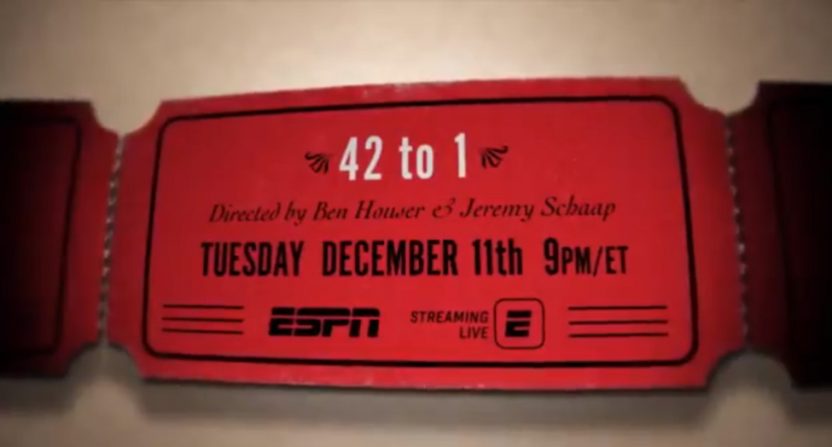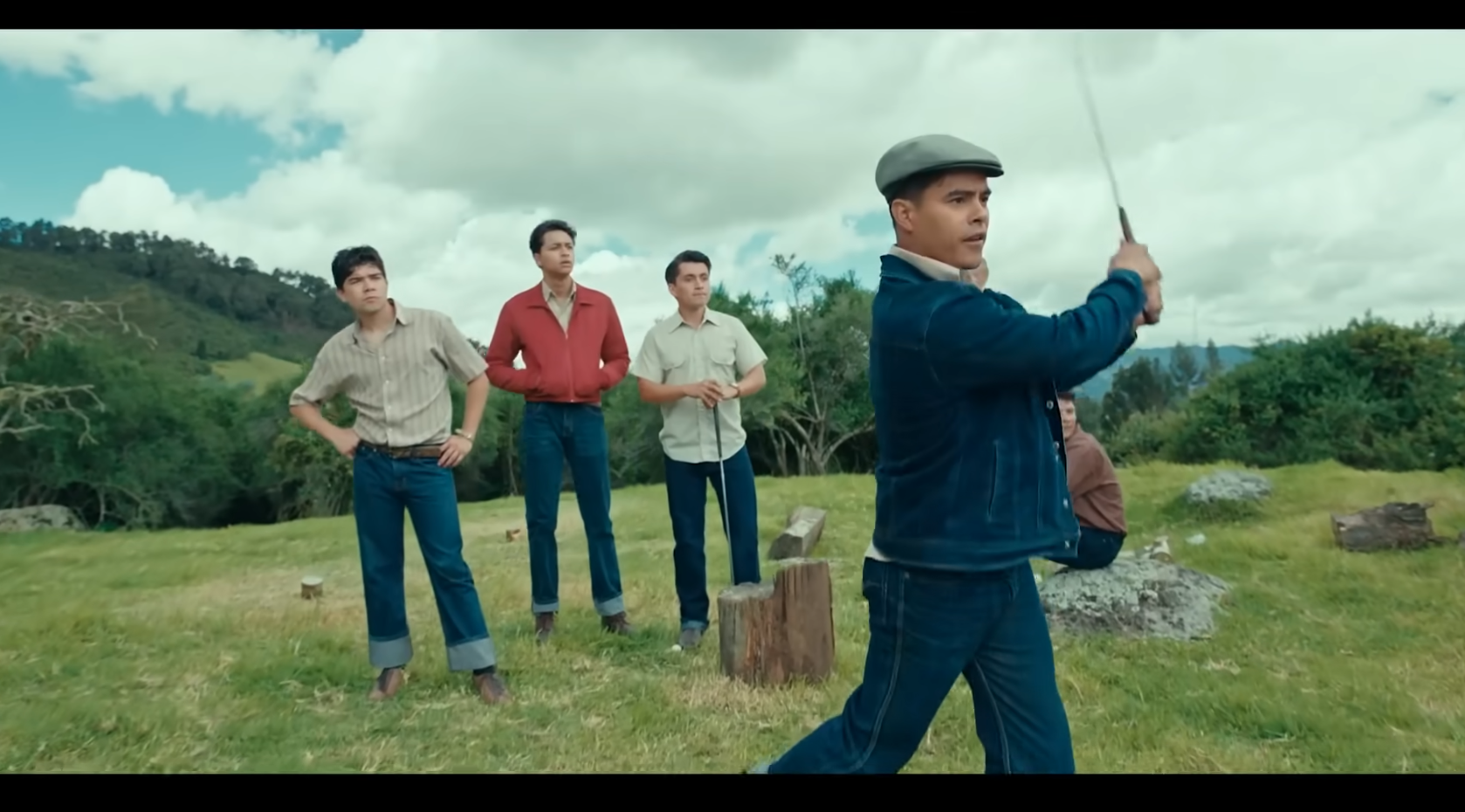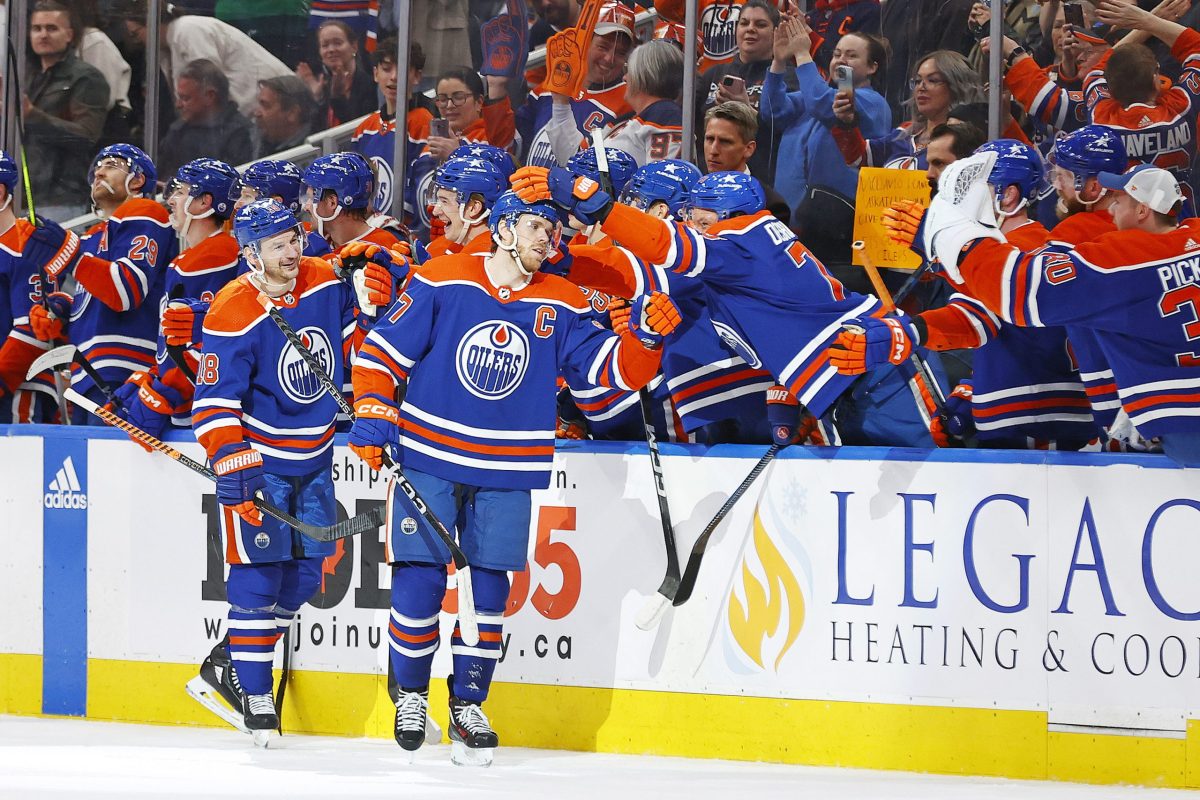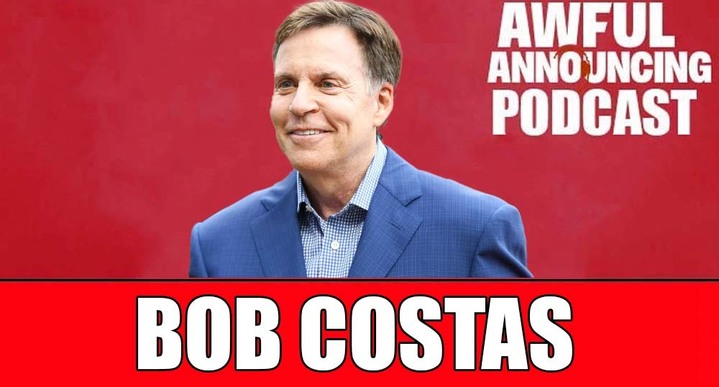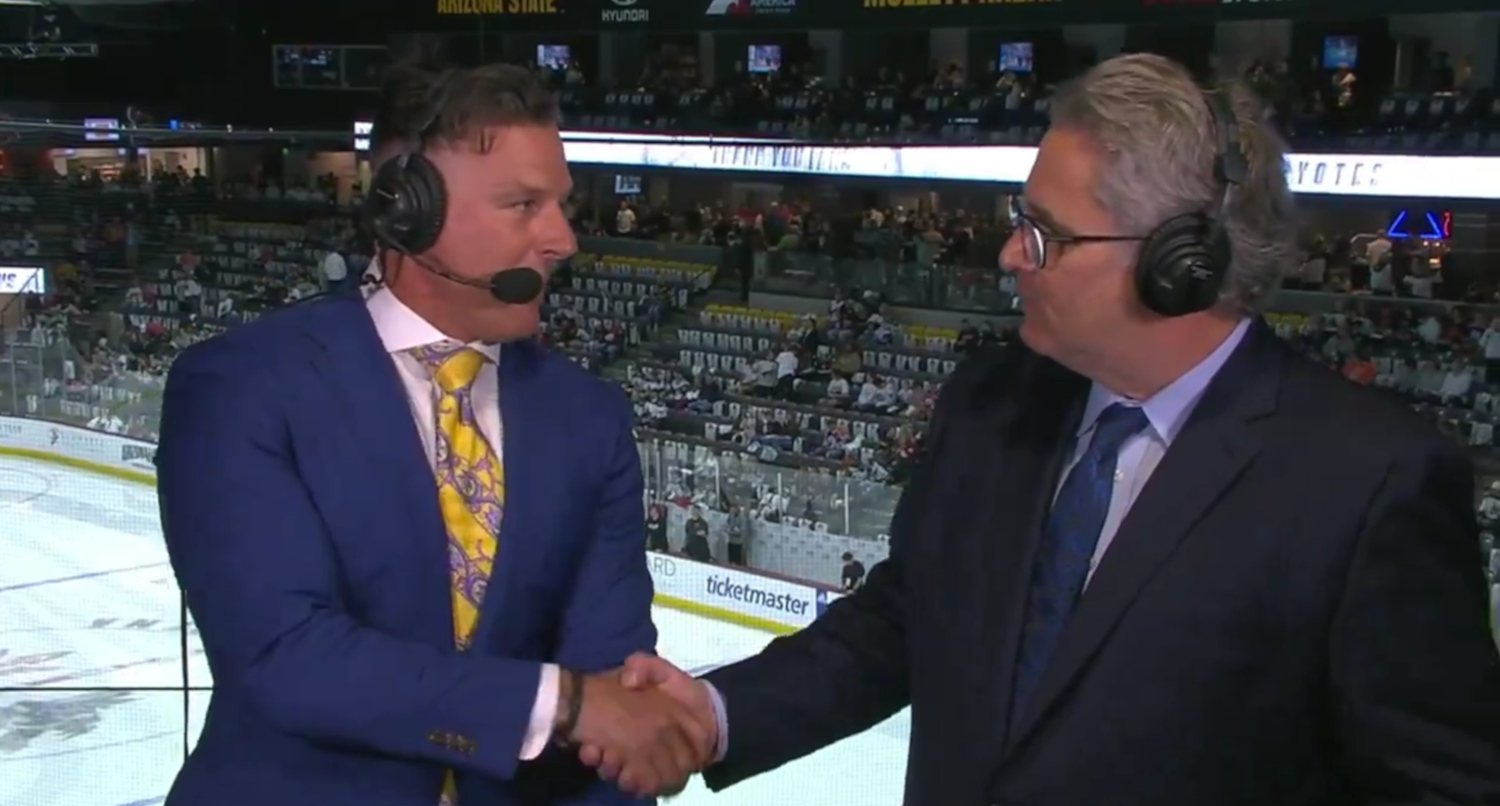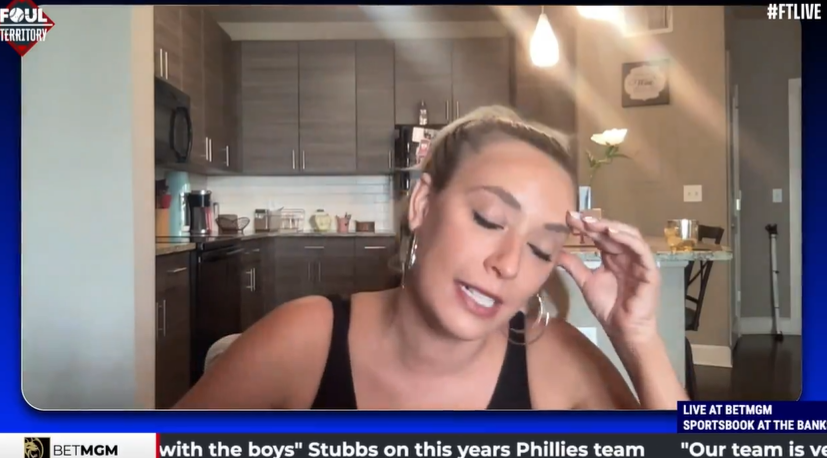On Tuesday at 9 p.m. Eastern, ESPN will premiere their latest 30 for 30 installment, “42 to 1.” The film (the first 30 for 30 to first premiere on linear ESPN since February’s “The Two Bills”) focuses on Buster Douglas’ upset of Mike Tyson in February 1990, and it’s co-directed by Jeremy Schaap and Ben Houser. Last week, Schaap spoke with Awful Announcing about the film, how it came to be, and what he wanted to focus on. To start with, he said this came out of a conversation he had with Libby Geist (ESPN’s vice president and executive producer for ESPN Films and original content) last fall, and it came about because of the passion he’d always had for Douglas’ story.
“It was October last year and I was having lunch with Libby Geist, who is an old friend, and we were talking about projects, and she said, ‘Is there anything that you want to do?’, and I said ‘I haven’t really thought about it, but the thing I’ve always wanted to do is the Buster Douglas story, it’s always been in my back pocket.’ And I told her why it’s a great story, and I think more than anything else, she was impressed with my passion for it and my enthusiasm. And the next day she said ‘All right, let’s do it.'”
He said working with Houser and other E:60 colleagues made this an ideal fit.
“And there’s kind of a perfect partnership, because I got to work with my E:60 colleague Ben Houser, who really did all the hard work here and deserves all the credit. So it was kind of a nice situation, being the co-host of E:60, working with E:60 colleagues, doing it in-house, which is not something they’ve done very often with 30 for 30. And it’s a story that Ben and I had talked about over the years, maybe doing something like this, and without any agenda whatsoever, Libby asked if I had anything and I suggested this. Because he’s a name that everybody knows, but nobody knows the details. I keep saying ‘Nobody knows the second sentence of the story.'”
Schaap said there were some similarities to E:60 pieces he’d previously done with Houser, but one big change was that he wasn’t narrating the project.
“It’s not that different, because we had done long-form projects together, and we’ve worked together for years, before E:60 even existed. But the way this worked, frankly, I pitched it, I said I wanted to work with Ben, we went about this. In a lot of ways, it was similar to the process with E:60: I do the big interviews, formulate the story together, but here, there’s no narration, there’s no on-camera presence, there’s no tracks. And as someone who has spent 25 years trying to get his face on TV as much as possible, this is hard to accept! It’s a little disappointing actually to see the project turn out so well because it does lend credence to the argument that I’m superfluous.”
He also said Houser, editor and producer Mike Sciallis and others deserve a lot of credit for the finished product, as he couldn’t be involved personally every day given his other commitments.
“I was continuing to do my day job on E:60 and hosting a radio show and all that, while Ben was in the edit booth every day with Mike Sciallis, our editor and producer. So they’re the guys living, breathing, sleeping this for the last several months, while I’m the guy showing up once a week to say ‘Oh, that looks really good.’ They’re so good. Other than big-picture notes and thoughts and a little bit here and there, it was almost more of a supervisory director thing for me than anything else.”
Schaap said that the narrative of Douglas beating Tyson had long been known, but the story hadn’t been really been explored in depth in a long TV feature. The previous pieces he’d done on it for SportsCenter had sparked his interest, and encouraged him to dive deeper.
“For me, it goes back to when I did a piece back in 2010 on the 20th anniversary, I did a piece in 2014 as the 25th anniversary was approaching, and it’s always been this kind of lower-hanging fruit because it’s this incredible story that nobody’s ever told, really told, and I just never got it. And Libby’s like ‘You’re right!'”
“…And I was dissatisfied, frankly; I got to do pieces for SportsCenter on those earlier anniversaries, and they were eight minutes long or nine minutes long, which was long for SportsCenter back then, but it doesn’t do full justice to it. You can’t even get into…to me, the heart of the story is this father-son dynamic, this relationship with his father Billy. And even fight fans I know, aficionados, don’t know that his father was a fighter (as William “Dynamite” Douglas), much less his trainer, a contender, and a guy whose reputation in the game was the polar opposite of Buster’s.”
Schaap said for him, that father-son story wound up being a crucial angle here.
“And that’s the dynamic that’s so interesting, that conflict, that tension between him and his father, and the love, and the resentment, and the decisions. He had to fire his father after he failed to win the title on a previous occasion against Tony Tucker. That’s not easy, firing your father! But he knew…I don’t want to sound like a CompLit major, but there is this Oedipal thing, this Sophoclean conflict that is the heart of the Buster Douglas story.”
“This was one of those stories where we sat down after we’d gathered all the interviews and gone out and talked to everybody and said ‘Okay, what is this about?’ This is about a guy who pulls off arguably the greatest upset ever in sports, that’s what happened, but what it’s about, it’s about his relationship with his mother, who dies 23 days before the fight, it’s about his relationship with his father, who is his hero, and also, in some ways at some points, his nemesis. And it’s about how he has to break free from his father to realize the potential, to get to where his father wants him to get.”
“And it’s about fathers and sons, mothers and sons, and something that to me, in all those notes that we tried to keep hitting, after the fight, when Buster’s standing in the ring being interviewed by Larry Merchant and breaks down talking about his mother and dedicating the win to his father back home, you know what he’s talking about. That’s what the story is about, it’s about the emotion, it’s about sowing the seeds for this family drama. And there are others around him as well, and inflection points as there are in any story, losing the title fight to Tucker and having to fire his father and all that, but it’s all building up to what happens in the 10th round and then in the aftermath in the ring.”
Here’s a trailer for the film:
Tyson vs. Douglas: the biggest upset in boxing history.
"42 to 1" premieres Tuesday, Dec. 11 at 9pm ET on @espn pic.twitter.com/fimycsh1JS
— 30 for 30 (@30for30) November 22, 2018
There’s been a lot of recent debate about the future of boxing, with HBO leaving the sport, many fights shifting to DAZN, and discussion around if Showtime will stick with it (they say they will). Schaap said he’s not sure of the market for live fights, but he’s convinced that there will long be an audience for boxing stories.
“There have always been boxing stories. That’s one of the remarkable things about the sport. You can’t kill people’s interest. Even when those people don’t watch fights and the biggest fights are behind very high paywalls, you still get all these movies about boxing. And it’s because it’s just the perfect crucible for storytelling. It’s elemental, it’s primal, it’s one person against another, it requires courage, dedication. And it’s also about risking everything, which you can’t say when you make it a baseball movie or a football movie or any other sports movie, except maybe about Formula One in the 1960s and 70s. And right now, we have Adonis Stevenson in a coma after a fight, after what happened. It’s gladiatorial, it’s primal, and that’s why I think there have been more great boxing movies than all other sports combined.”
He said he feels the Tyson-Douglas story in particular is one that’s better than any script.
“And this is a fight that is stranger than fiction, unbelievable if it weren’t true. Sylvester Stallone wouldn’t have dared to write a script like this for Rocky, where Rocky kicks the other guy’s ass for 10 rounds. And that’s what happens here, it is stranger than fiction, and it’s just amazing because it’s one of these moments where you don’t have to gin up anything. The significance? It’s the heavyweight title of the world. The drama? He’s fighting the most famous athlete on the planet, who at the time was considered by many people to be the greatest fighter ever. You don’t have to build him up into any creature he wasn’t, like Max Baird in the Cinderella Man movie.”
“You know, this was Mike Tyson; he wanted to kill people, he was the baddest man on the planet. And here this other guy comes along, and nobody thinks he has a chance, there’s nothing in his record to indicate that he has a chance or stands a chance, his mother dies before the fight, he’s got this conflicted relationship with his dad. And what does he do? He creates a performance for the ages.”
The latest
“We tried to get Mike to sit down to talk about it, and I had got him to talk about it in the past. In fact, we interviewed him last year at his home for an E:60 piece, and I was thinking I always have this in my back pocket. Because you can’t always get Mike, you know? I’ve interviewed him 500 times, but I’ve probably made 100 requests that I didn’t get a response to. So I got him, and in one of the early cuts, we had sound from that interview, and we just decided, you know, it wasn’t great. It wasn’t great sound anyway, there were a few good bites, but it was distracting to see Mike today when we had so much from him in context, contemporaneous in the film. So we made the decision that we weren’t going to use the fresh stuff.”
“Now, if we’d had a full brand-new interview, it might have gone another way, it might have been impossible to say no, because Mike is compelling. But we did always feel that when you put Mike into the mix, he can overwhelm things, and again, this isn’t his story. We’ve heard his story. And there’s so much from him in the moment, to see him now, I think it could have a deleterious effect. So I think ultimately, the way it turned out, it’s fortunate that he declined our request.”
Overall, Schaap said he’s thrilled about 42 to 1, and he credits his team for how it’s turned out.
“I just want to emphasize how lucky I am to be working with guys like Houser and Mike Sciallis and Mike Bollacke, our director of photography on this, because they are as good as it gets. And I’m feeling guilty doing a lot of the interviews and press because they’re really the brains of this operation.”
42 to 1 premieres on ESPN Tuesday, Dec. 11 at 9 p.m. Eastern. You can read our review here, from AA’s Ben Koo.

